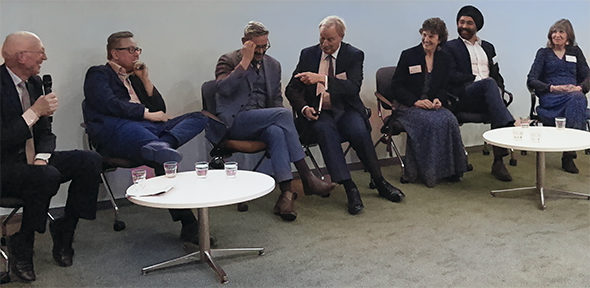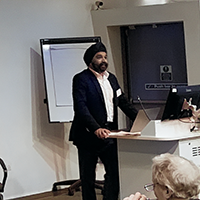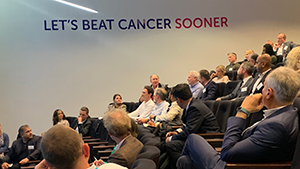
Submitted by Irena Rao on Fri, 19/04/2024 - 11:23
On 16th April the Early Cancer Institute hosted over 100 delegates, representing the finance, biotech and pharma sectors, clinicians and researchers, among others, at an event entitled: 'Cancer prediction, interception and detection - A partnership with the Early Cancer Institute.'
Against the backdrop of an estimated 50% worldwide increase in cancer incidence by 2045 it is clear that earlier detection and intervention of the disease is now more crucial than ever. The attendees heard keynote speaker Sir Harpal Kumar, President of GRAIL Europe, outlining the company’s work towards an effective multi-cancer early detection test. He also described how the route to market for early cancer detection and treatment innovations could be greatly shortened, for example by considering different clinical trial endpoints.
The invitation-only audience was treated to a showcase of the breadth of research taking place within the Early Cancer Institute, with Director Professor Rebecca Fitzgerald describing the Institute’s vision and Group Leaders Jamie Blundell, Matt Hoare and Serena Nik Zainal representing work ranging from investigating whether it is possible to stop cancer before it even starts, to ways that we could potentially reduce the incidence of liver cancer by identifying at-risk groups, to the use of genomic profiling to identify a cancer patient’s likely outcome, and how this may differ from another person even though they may have the same type of cancer. These types of longitudinal studies and genetic profiling require analysis of huge amounts of data, and the acquisition and storage of these data is another challenge that the research groups are addressing.
The event was co-hosted by Lord David Prior, former Chair of NHS England, member of the Early Cancer Institute Scientific Advisory Board, who ably chaired a panel discussion entitled Transforming sick care into healthcare. The panellists gave insights from a number of perspectives, including that of a patient, a clinician and a research scientist, with input from the audience.
Following the talks, the delegates had the opportunity to network and to view exhibits from three Early Cancer Institute-linked companies: Cyted, Synteny and Senesys Bio. The conversation was lively and engaged and many attendees reported that they had made excellent connections.
In order to maintain the momentum and the obvious enthusiasm amongst the many diverse sectors working in earlier cancer detection and interception, the new group will be known as the Early Cancer Institute Innovation Partners. We will be following up on a number of ideas and we are very much looking forward to seeing what the future holds.


